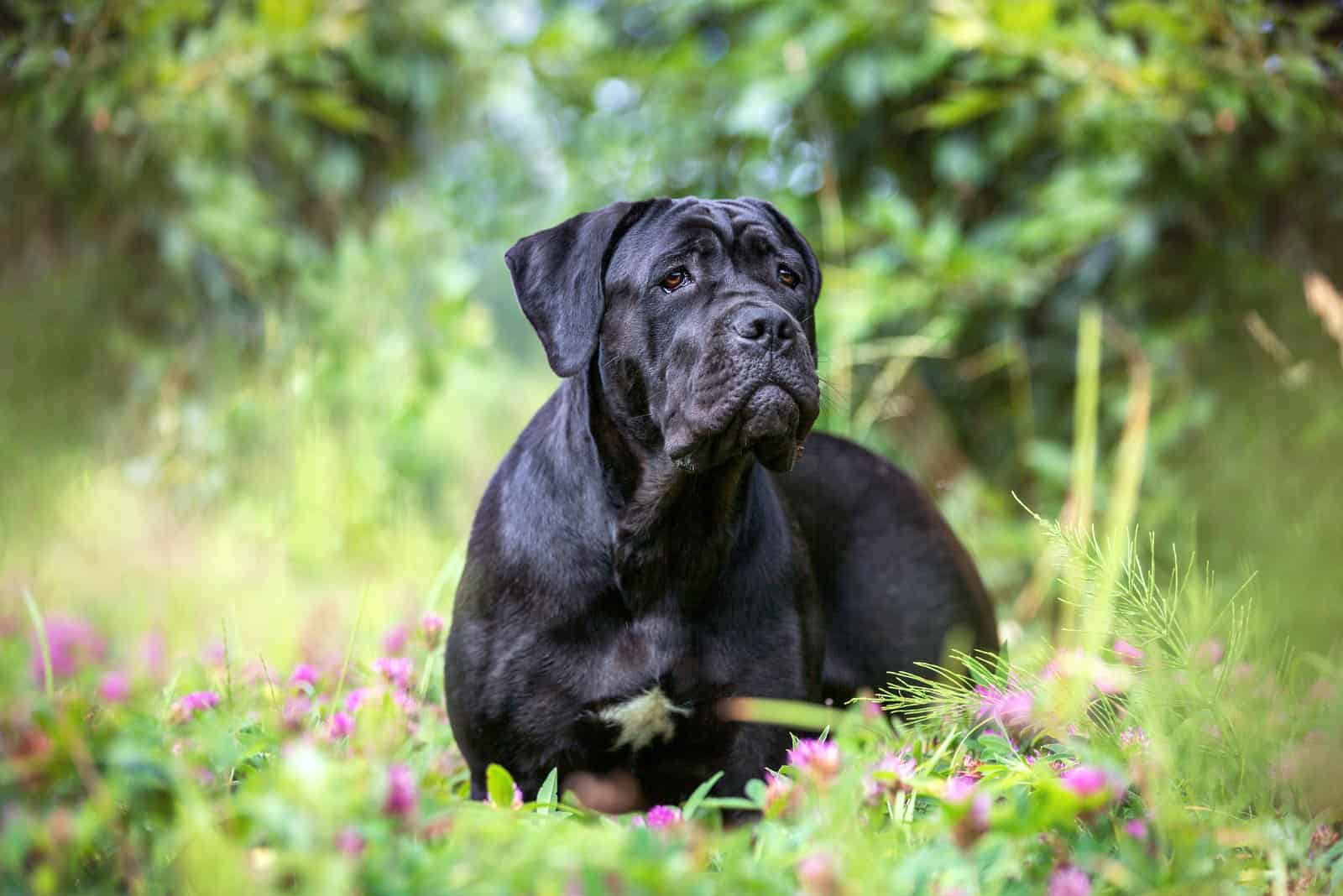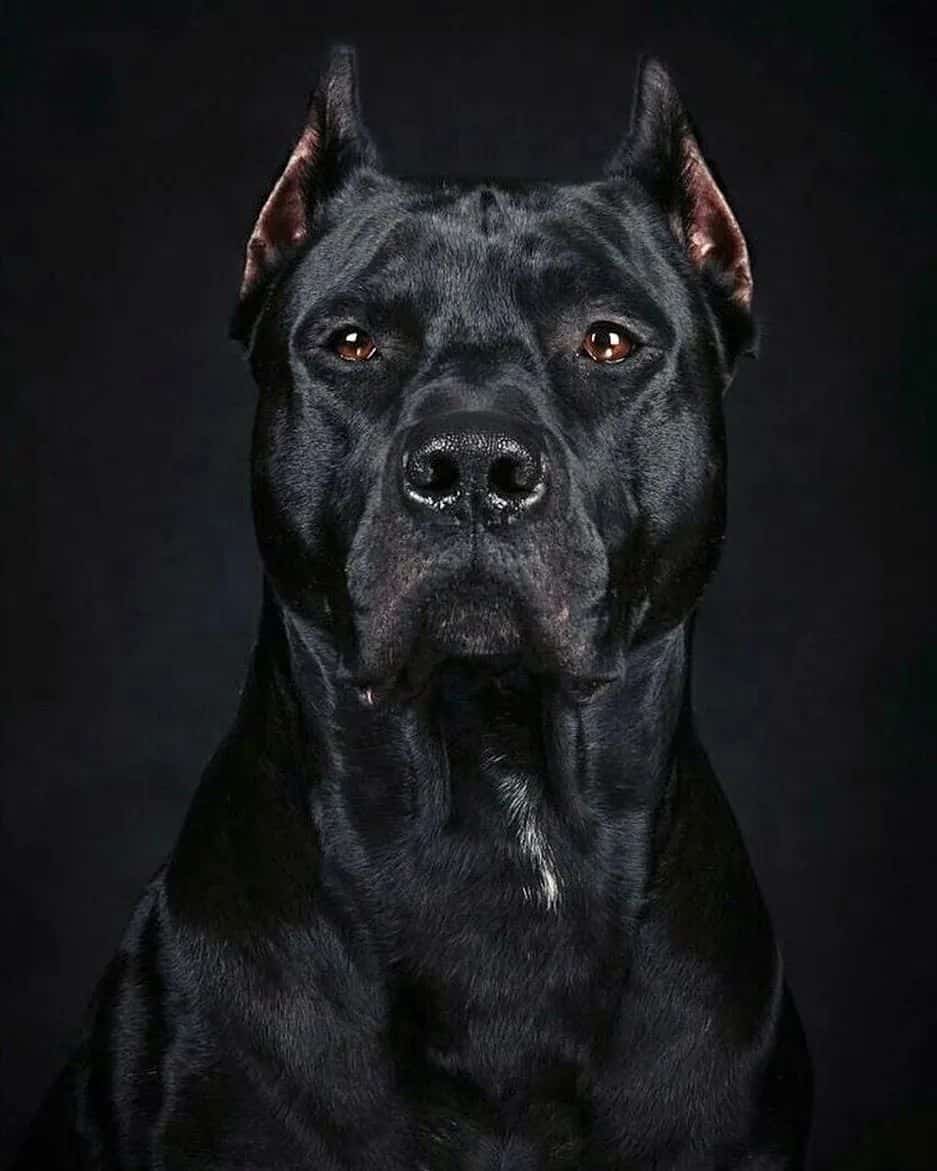At first glance, short-haired dogs might seem like they never shed.
Their fur often resembles an otter’s coat rather than a medium-length dog coat, such as the German Shepherd’s. This is actually a fairly common misconception. They do shed, and their short coat needs special care.
Some might even say that it’s more difficult to take care of thousands upon thousands of tiny dog hairs than just your regular mutt’s average-length coat.
It sticks to everything, and are so easy to miss! Often, you spot it on your clothes way too late as the sunlight suddenly reflects every single hair perched on your tidy black suit while you are already on your way to an important meeting.
To prevent such occurrences, we researched, and researched, and put together the only article you will ever need on Cane Corso shedding and coat maintenance.
We hope it serves you well in your future battles with short, prickly, dead hair.
Let Us First Shed Some Light On The Cane Corso Breed
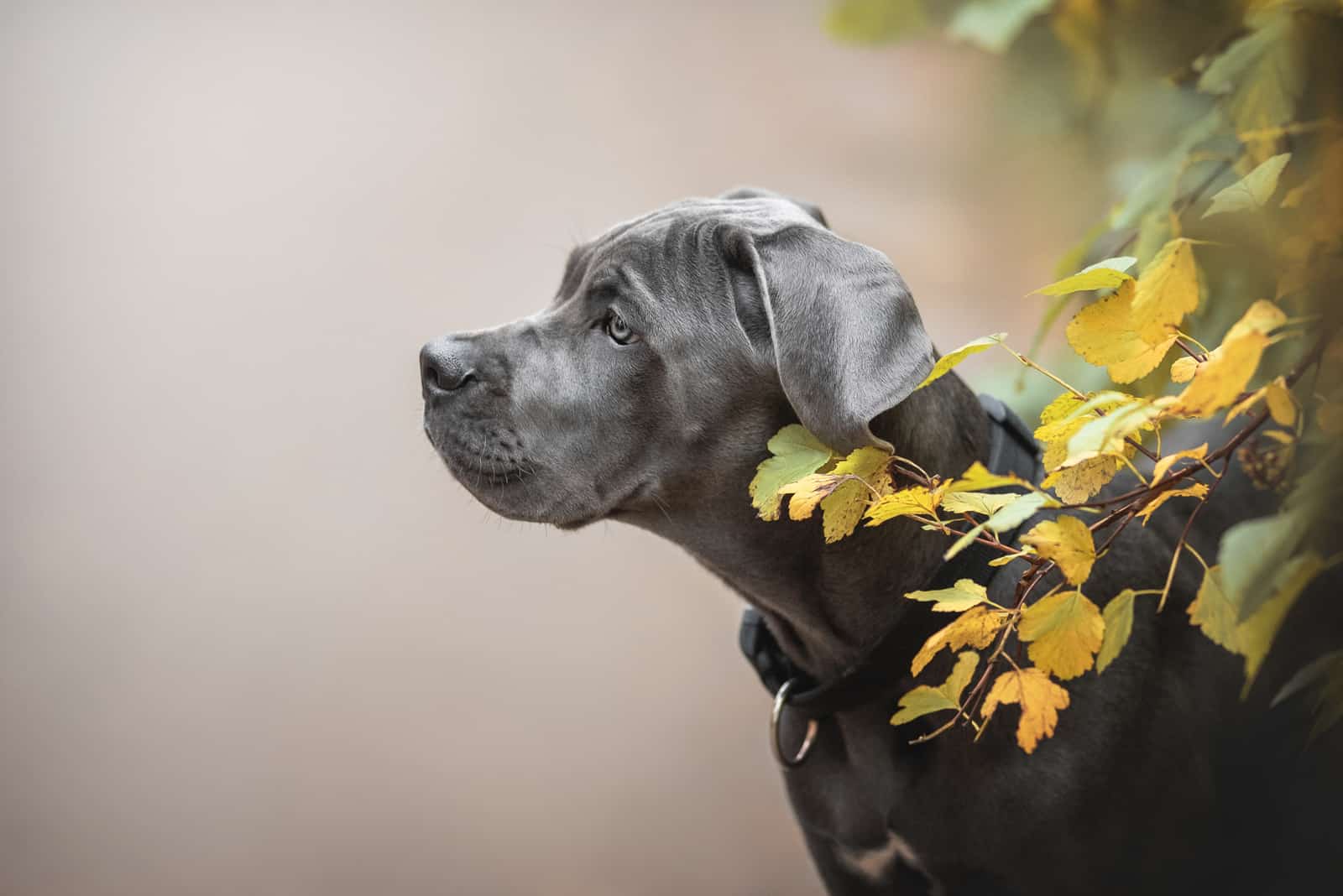
What do we know about the Cane Corso? It is a big dog. It’s well-built, and it has a menacing look and a powerful bite. It’s a working dog for sure. It’s a killer breed, no mistake.
But, is it also a loving family pet?
Where Do Cane Corsos Come From? Warm Climate = No Fur Needed.
The Cane Corso comes from that boot-shaped peninsula known as Italy. So many cultural treasures were given to us by this nation that it’s hard to keep count.
They descend from early Roman Mastiff breeds that were used as guard dogs and dogs of war throughout history. Their name is bluntly translated from Latin as ‘protection dog’.
Their ancestors were the fearsome Canis Pugnax, that were the scourge of the battlefield in their day and age, charging alongside legions to shock and demoralize their unlucky opponents.
This dog was of similar build, appearance, and temperament, and served a similar purpose to the Cane Corso.
As the world knew no rest, neither did the Cane Corso dog, serving as a working dog throughout its history, whether it was for hunting, for protection, or for military tactics or even herding!
As the need for dogs of war declined, the Cane Corso and similar breeds started to die out, but it was bred back to life by its many fans in the late 20th century. This is a common pattern for a lot of breeds, owing to the events of World War II.
Because of its scarcity, it took some time for this breed to be recognized by the FCI.
Along with the Italian Mastiff, it is considered Italy’s national Mastiff breed. Enthusiasts form Cane Corso Kennel Clubs with the mission to maintain its breed standard and add to it in certain ways.
Today, it is obsolete on the battlefield with all the drones and rocket systems and animal cruelty laws in place. It is still a working dog, though, and it doesn’t matter if it has worked or not. History left an imprint on this breed’s DNA, and therefore, the Cane Corso is always on duty.
This Roman Mastiff Looks The Part As Well
The first thing you’ll notice about this dog is its rigid (to the point of threatening) stature and its big, gaping pie-hole sporting what looks like the world’s most insincere grin at all times. This dog has an amazing, ideally muscular build, which adds to its intimidating appearance.
It’s obvious at first glance that such a dog is not to be trifled with, and this is what makes them the ideal guard dog for businesses and houses alike.
The Cane Corso Coat
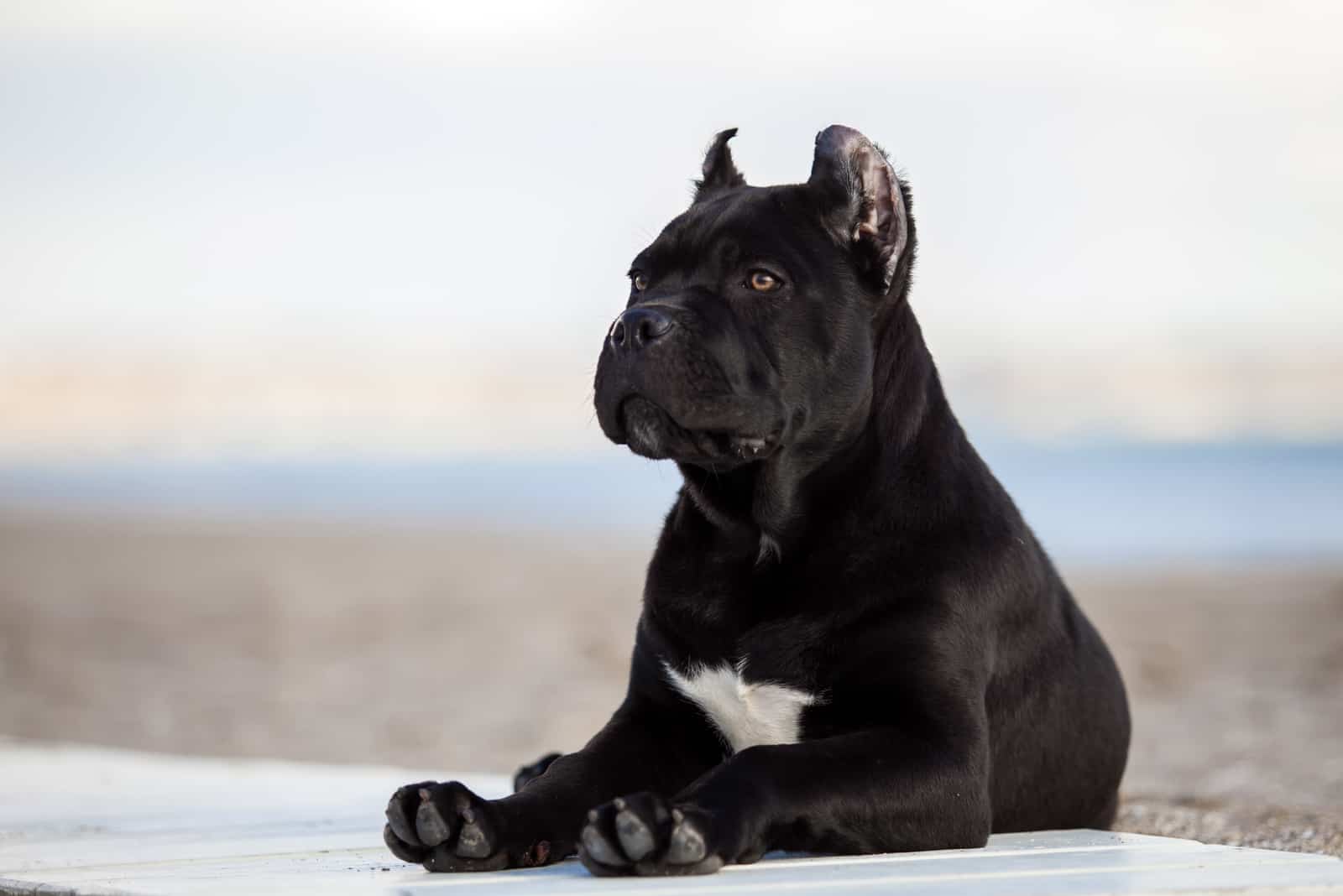
…is considerably cleaner than other canines.
In case you didn’t notice, I made a pun there… CCC? Anyone? Romans? 300? Nobody?
Never mind…
Please don’t leave yet… we haven’t gotten to the most important part! We need to tell you about the Cane’s short coat, its appearance, how to take care of it, etc.
Does it have benefits? Does it have setbacks? Is it right for you personally?
We took our time compiling all the facts into one neat, useful article.
Without further delay, let’s jump into the matter!
It’s Short, Rough, And Shiny!
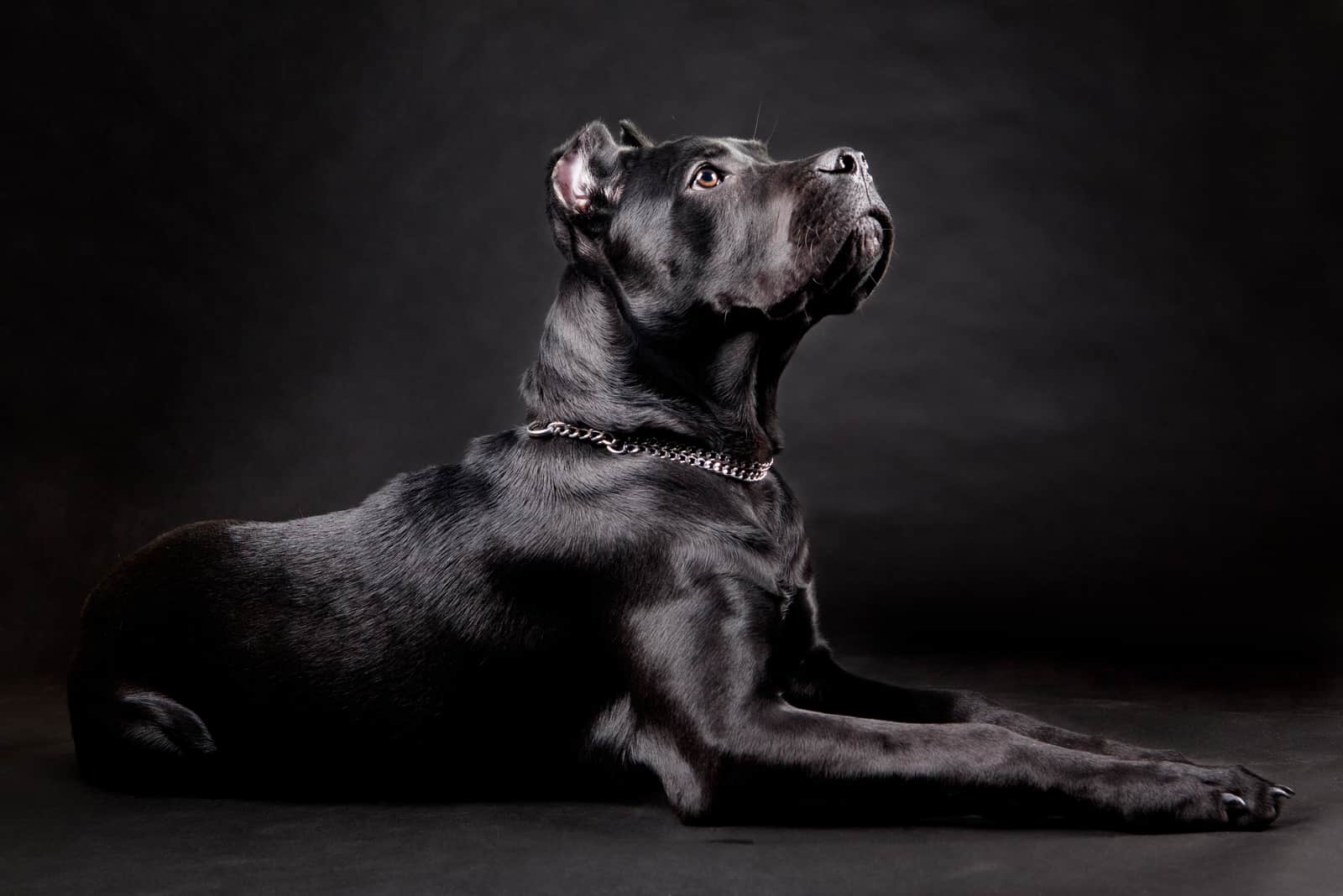
If you like the rugged feeling of a shaved head or a 5 o’clock beard, then you are going to love petting a Cane Corso. This breed’s fur is one of the shortest in the canine world.
Cane Corso puppies might have soft, feathery strands, but they are hard and prickly in adult dogs.
Counting Cane Corso Coat Colors
Cane Corso coats come in a small variety, namely:
• Black
• Gray
• White
• Fawn
• Red
There can be variations in lightness, but any other color is considered non-standard.
Breeders advertising their dogs to be of another, unusual color, such as blue, should be steered clear of. The puppy may appear faintly blue, but grow up to be either gray or black once their colors set in.
Any breeder resorting to misleading and gimmicky advertising is bad news in my book.
The Brindle Cane, the kind with brown tiger-stripe patterns, are especially valued and sought after. The only other acceptable pattern for a Cane Corso is none at all, and most of them only have one color. Their face color may vary according to the American Kennel Club’s breed standard. White spots can be found in some unicolor Canes, and they are okay pedigree-wise, but don’t constitute a specific pattern.
There are also some non-standard colors known among Cane Corso breeders, but they amount to shades of the aforementioned, and are negligible as such.
Do Cane Corsos Shed? Shedding season:
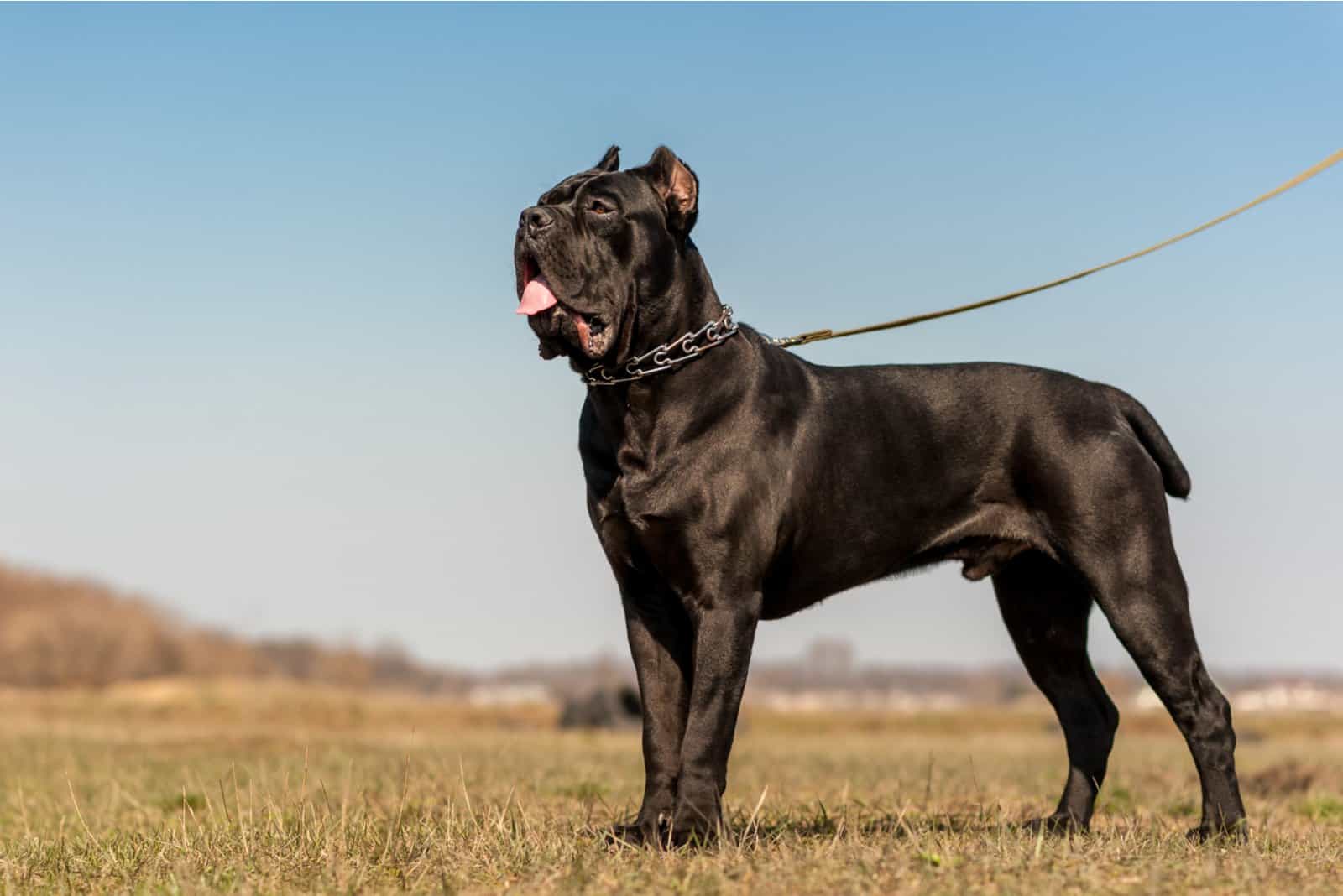
Its double coat is purged of loose hair during each shedding season.
But… that’s it! These large dogs aren’t big shedders at all!
The hairs that they shed are so tiny and discreet that you probably won’t notice it at all unless you check your house with a microscope.
Spring and Autumn is when they go through the natural cycle of hair replacement, so you might find yourself sneezing more in this period if you are a Cane Corso dog owner who’s sensitive to dog-related allergens.
This Large Dog’s Skin Is Far From Allergen Free, Though
That’s right… its fur is not hypoallergenic!
Most short-haired dogs are not, even though it might appear so.
Their short, rough strands that get everywhere are maybe even more problematic to a sensitive person.
If you are looking for a dog to go along with your stuffy nose, maybe you should check out some long-haired dogs that are completely covered in fur instead. I’m not kidding! Nature can be very weird at times.
The Cane Corso’s Undercoat Is What Drives The Excessive Shedding
The Mediterranean isn’t the worst place in the world to be at all. Beautiful beaches, breathtaking sights, and a warm to mild climate at all times!
The temperate and fertile piece of land they called theirs at the very beginning is one of the key points of Rome’s success. It’s only natural that the Corso isn’t built for cold weather like the Husky or the Samoyed.
It is also a dog commonly seen throughout history in urban settlements, among people and soldiers, rather than guarding sheep from half-frozen, starving wolves on high altitudes like some dogs.
They do have a basic undercoat, which is something for the cold days. It’s very easy and rewarding to take care of.
Cane Corso Grooming Tips:
Naturally, a Cane Corso is a rare sight at a groomer’s studio. The only reason I can picture one being there is for some killer hair extensions.
Canes, and most other short coat dogs, do need to be groomed, though. Their dog DNA doesn’t care about the state of your carpet or sofa.
The best way to do this is by using a medium bristle brush or a bristled mitt; one of those glove brushes. It is a good idea to use a deshedding tool like the Furminator to get the maximum amount of hair off of your canine family member.
A list of Pitbull brushes might come in handy as they have similar coats.
Remember, it’s only a matter of time before loose hair is liable to take over your household as your pup goes through a bout of dog shedding. To prevent this, it is suggested that you groom your Cane more often when they are scheduled to shed their coat, which usually happens at the changing of seasons; most notably come Spring.
When you groom your Cane (or any other short coat dog for that matter), the most important thing is to do it as gently as possible, especially when using steel deshedding tools.
These dogs are also typically slim and well-defined, and there’s not a lot cushioning them from your Furminator. You don’t want to traumatize your dog by accidentally scratching at its pronounced bones or spine; it’s a nasty feeling and it even hurts the dog!
Be sure to use a gentle, downstroke motion, and mind its vertebrae and limb bones.
Make your dog feel safe by talking to it and petting it the whole time, especially if it is new to the process.
Reward it with a treat afterwards and it might even look forward to the next grooming session!
Dogs are such simple beings, and positive reinforcement does wonders in any situation.
High-Quality Dog Food To Maximize Shine And Minimize Shedding
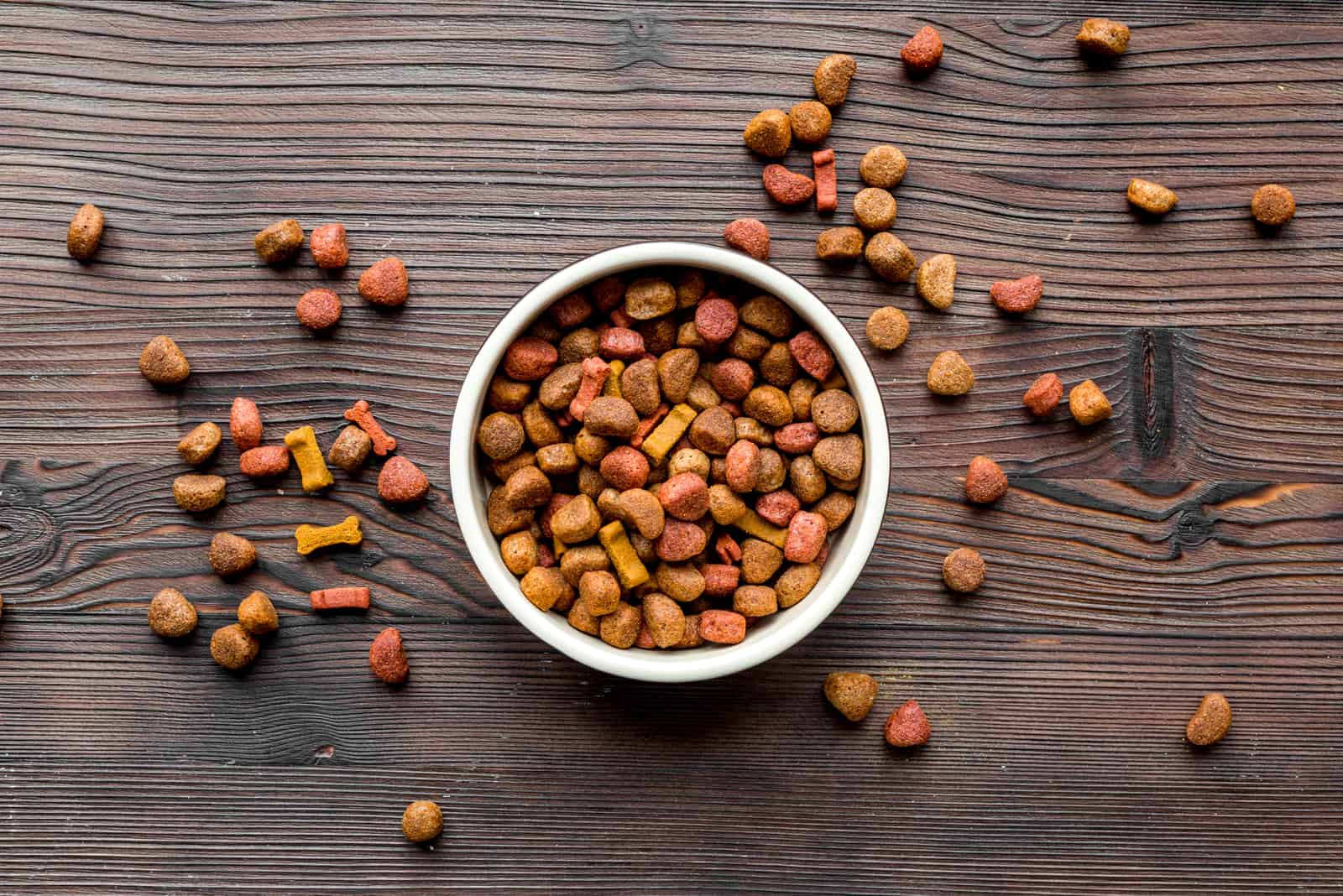
Humans should not feed their dogs trash or leftovers, but we know that already. For every dog out there that is given just about anything its owner didn’t feel like eating, there is one that is fed high-quality dog food and given the right supplements. It’s a sharp contrast, but the same can be said for humans.
The coat, among other things, is a telltale sign of a dog’s nutrition. A healthy dog’s fur is rich, has outstanding color, and glistens in the sun.
Your Cane Corso’s buzzcut coat can shine like a diamond if taken care of right. It has a natural gloss about it that is bolstered by good nutrition, exercise, and lack of stress.
Quality dog food is made by expert nutritionists and vets who did the math on the optimal amount of each macronutrient, vitamin, and mineral that your dog needs, and you should base your dog’s diet around it.
Dogs are carnivores, and while there IS meat in most kibble formulas, they should sometimes be given proper meat that serves both as a treat and as a healthy meal for them.
The best pick for this is definitely boiled chicken prepared a la dog by using no ingredients that are harmful or inappropriate. Liver, fish, eggs, and even oats are all safe for your dog, and they contain a lot of vitamin B, which is essential for great fur.
Low vitamins and amino acids can also be replenished by using supplements.
Supplements That A Cane Corso Can Use For Excessive Shedding
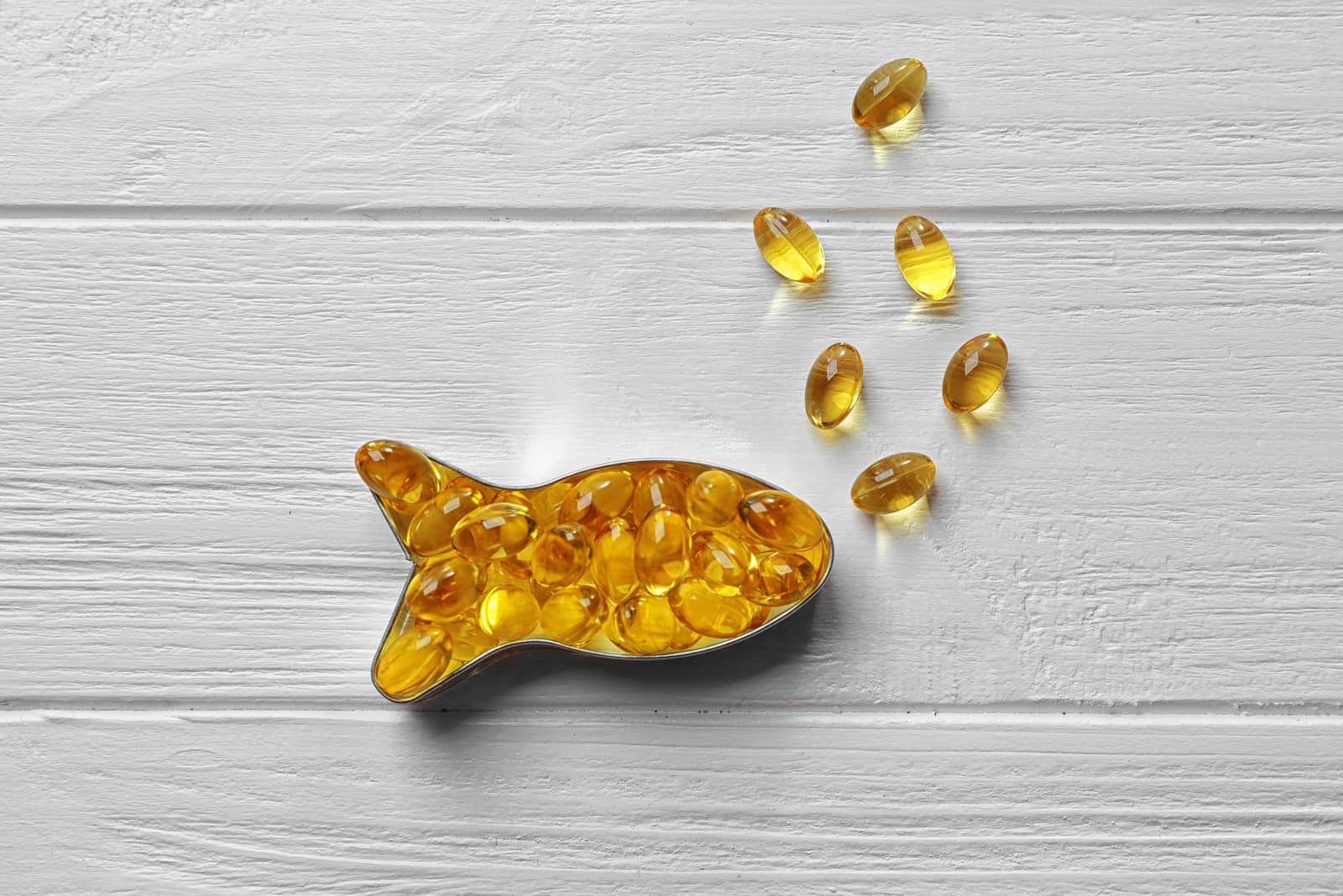
Every hair goes through the same lifecycle, with the growth beginning in the anagen phase, slowing down in the catagen phase, and falling out in the telogen phase. The goal is to keep your dog’s hair in anagen for as long as possible so that it loses a lesser amount of hair daily.
This phase is shortened if your dog lacks vital nutrients, and the result is unusual shedding.
There are natural options, such as fish oil, which comes loaded with omega-3 fatty acids vital for amino acid synthesis as well as growth factor stimulation. Your dog won’t even find it as bad-tasting as humans do. They probably find it delicious.
Some plant-based alternatives to fish oil are flaxseed oil and coconut oil, which are both safe for your dog and known to improve any dog’s skin and fur quality.
The large family of B vitamins is also relevant. Biotin is one of the most important vitamins in hair genesis and growth. There are a number of B complex vitamin pills or solutions that are customized for canine use regarding dosage, flavor, etc. Even though they are readily available for purchase, maybe you should check with your vet about things like dosage.
Too much may not be good for your pooch, and too little will not do much. A great natural B complex supplement is yeast. It can be bought in its raw form, and used for baking or special dog pills. It doesn’t matter which one you go for. Serve it mixed with some food and your ever-hungry dog is likely to wolf it down religiously.
Every dog is different. Did you know that every dog has a completely unique nose print?
It’s only natural that they can have their own inborn (or otherwise acquired) personal deficiencies, issues, metabolic irregularities, and so on. This can lead to constant shedding and dead hair everywhere. Your dog will probably not lose its hair, but you just might lose your mind vacuuming the house, so if that’s what you’re dealing with, then maybe it’s a good idea to try a supplement.
This Large Dog’s Skin = Heaven For Parasites
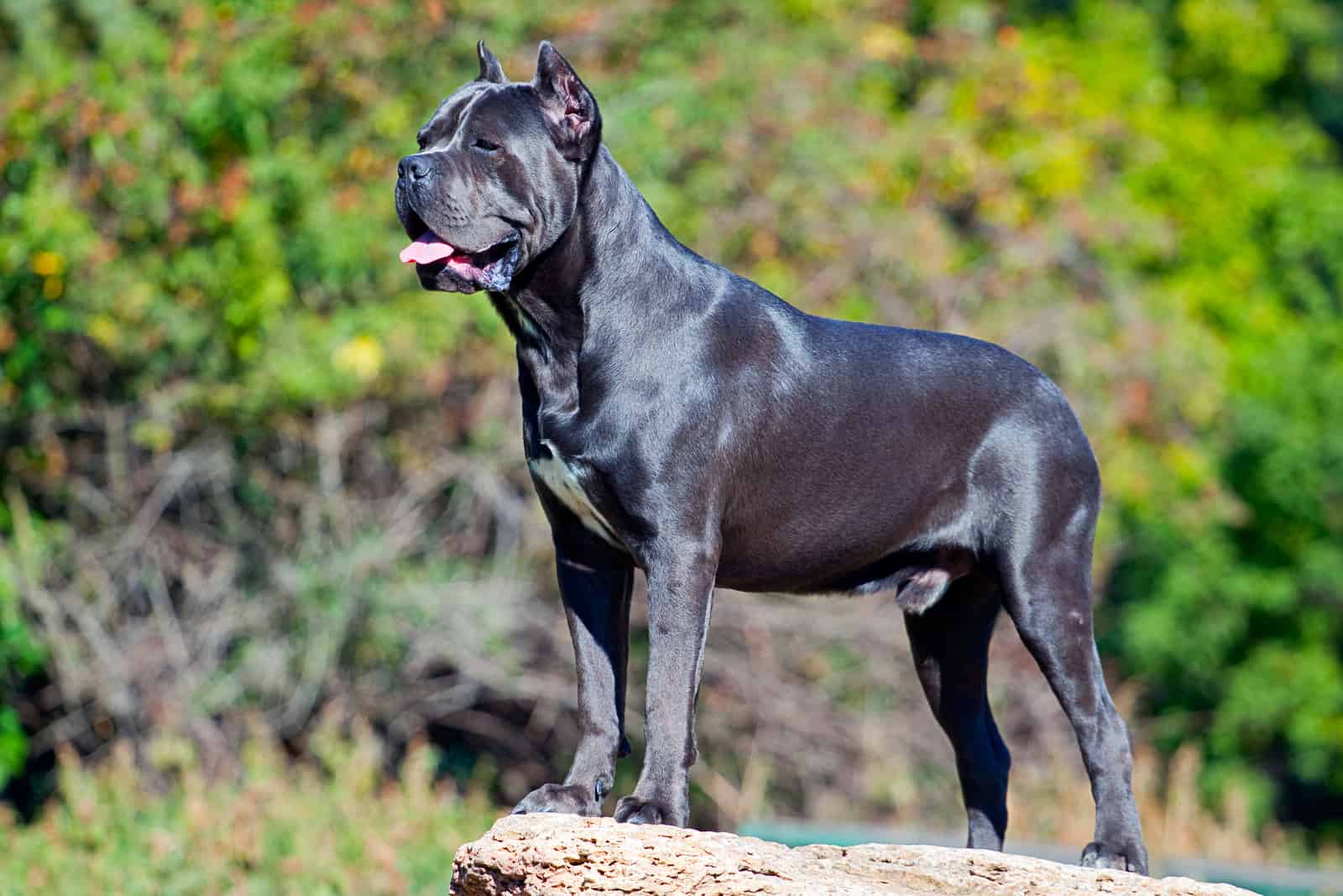
Fleas are some of the most disliked organisms on Earth. I bet nobody would bat an eye if they just stopped existing altogether.
They perch themselves onto strands of your dog’s hair and nest there while feeding off of dead hair and skin residue. Scratching at these uncomfortable sensations can leave your dog’s fur thinning in affected areas.
After finally settling in, they lay eggs and try to reproduce on your dog’s skin. It’s our mission to stop them before this happens. Special combs and shampoos are used to get rid of fleas and flea remains. Try to keep your dog quarantined for the time being as fleas can jump over to another dog at dashing speeds.
Demodex mites are tiny insects responsible for what we humans call mange. There are two types depending on whether the mites attack the hair follicles or the skin itself. One variant is inheritable, and it is caused by a faulty immune system, and the other one is contagious and spreads by contact. The symptoms are similar: inflamed, elevated patches of skin, burning, discomfort, and hair loss in patches usually starting at the snout.
These mites are naturally found on your dog’s skin in a symbiotic manner, and they only become pathogenic if their population increases beyond control for whatever reason.
Mange is difficult to treat, and it requires a variety of topicals, dips, and even oral pesticides. If you see any nasty rashes on your dog, it’s probably best to act quickly and contact your certified vet.
You Might Be Considering A Cane Corso Pup Or A Rescue
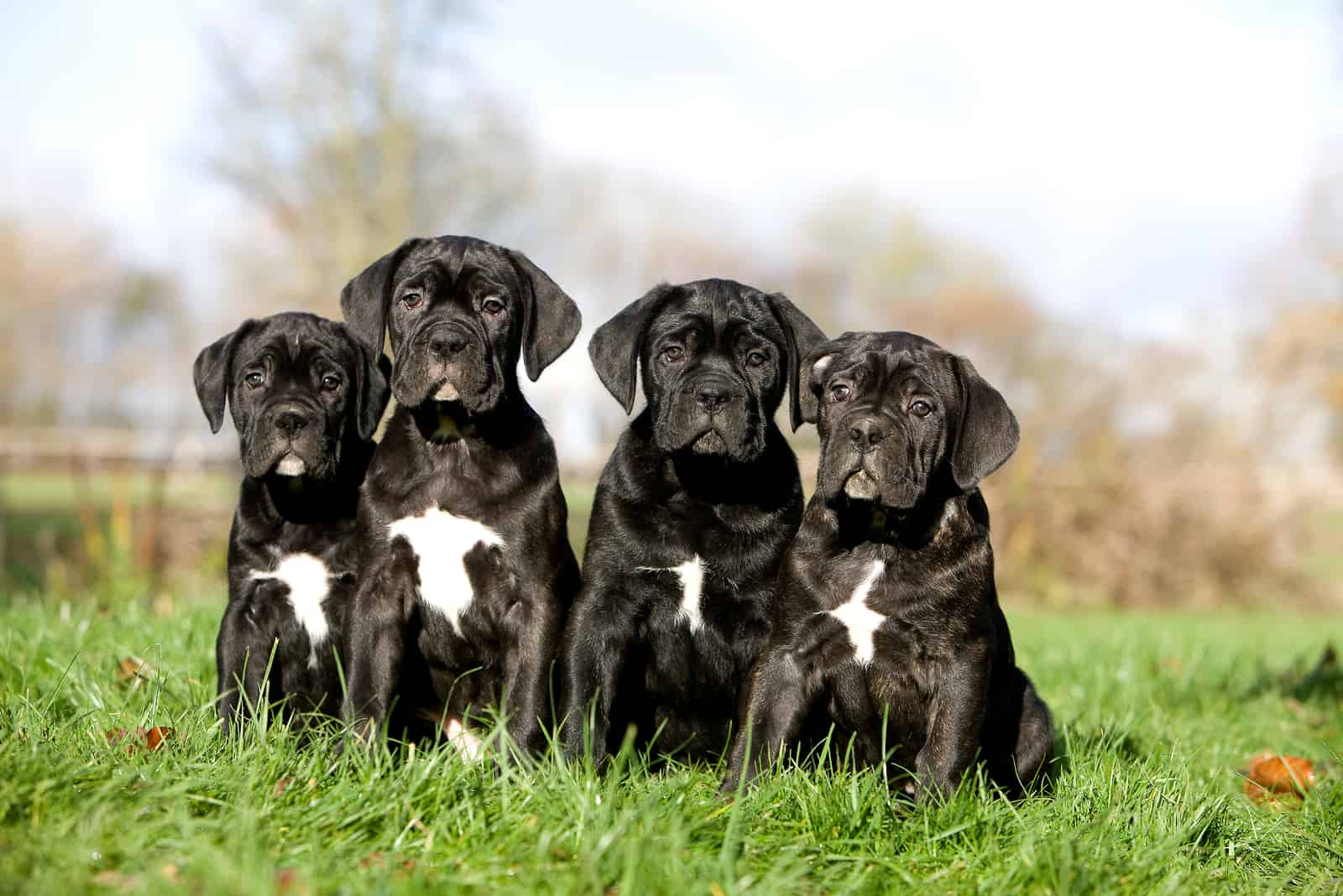
Who knows… maybe it was your search intent? Maybe you are here to add another notch to your pros or cons list regarding Cane Corso ownership. It’s only right to do your research, and kudos for doing so.
People who get a dog blindly or impulsively are often first-time owners who sometimes regret not learning the basics about their chosen breed, and this can lead to resentment and an uneasy relationship between the two.
It’s always best to think of anything that might be problematic when you invite a dog into your life. You could ask yourself the following:
‘Is the Cane Corso the right dog for me if…’
I live in a small apartment?
While a Cane can manage to live in flats, it is hardly optimal. These large dog breeds are lively and have a high energy level. They can’t get a good workout inside of four walls as there is nowhere to run, play, explore, etc.
Their excess energy just might be put into destroying your property or other mischief that can only cross a bored dog’s mind.
If you are an avid walker and can manage the daily input, props to you!
Owning a dog takes a lot of sacrifice and commitment; something people often don’t realize when getting one.
Stairs also do not mix with large breeds, such as the Cane. Climbing stairs is an unnatural motion for dogs, and large breeds that are prone to joint diseases, such as hip dysplasia or arthritis, are especially sensitive. Climbing several flights of stairs every day can take a toll on your pup. This is another thing to consider if you are living in an apartment building.
I Have Kids/Other Pets At Home?
Cane Corsos have no problem with being family dogs! If reared and raised right, this rugged bodyguard Mastiff can prove to be as loving and as gentle as they come… obedient, smart, and great with kids. This is, of course, provided that it is put through early socialization and taught good behavior like not jumping on humans, not barking excessively, etc.
Small dog owners should not consider a Cane or any other large dog breed with a high prey drive. This is no written rule, and they might get along just fine, but it could also be a one-way ticket to disaster. This goes for all other smaller animals like cats, rodents, birds, and so on.
It is possible to make your dog compatible with other pets through socialization. This should be done as early as possible. It is remarkably hard to change an old dog’s opinion on cats, for example. You know how the saying goes.
I Don’t Have A Lot Of Free Time
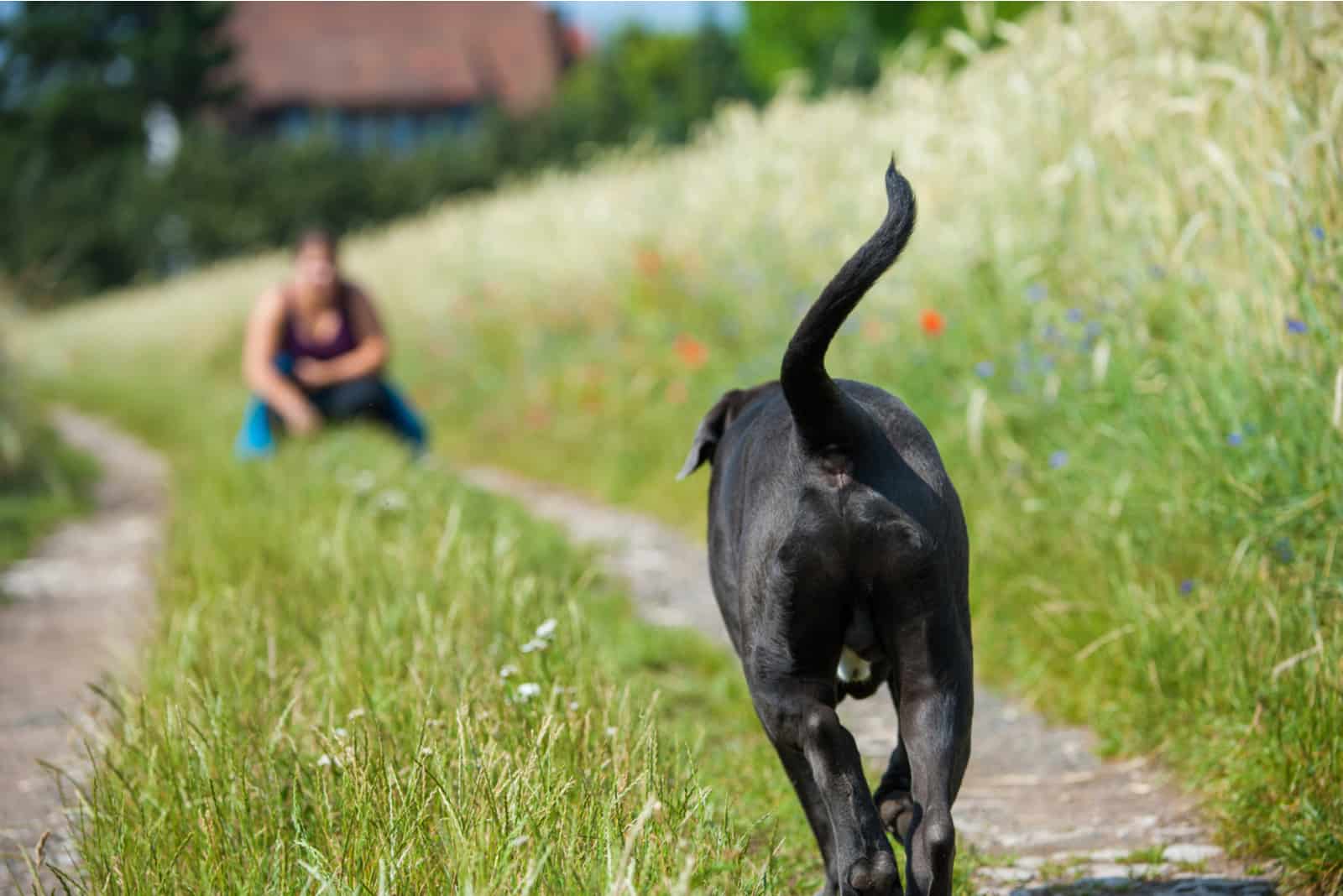
The time you save on grooming is the time you’ll have to put into hours of walks, fetch, or frisbee, trying to make a dent in your dog’s impressively high energy levels.
If you are a busy or career-oriented person, you might want to get a small dog or a more dormant dog instead.
It may not feel that important to you, but a lack of activity might make your dog feel anxious and neglected, and even strain your relationship!
I Am Sensitive To Dog Allergens
The Cane Corso is not a dramatic shedder. Its undercoat acts up twice a year and causes some excess shedding, but even this can be mended by grooming it with the right brush or deshedding tool. This being said, there is no guarantee that your allergies won’t act up around a Cane. They do shed hair, and they are not part of what are called ‘hypoallergenic’ breeds.
You might be interested in one of these shed-free dogs if you’re sensitive to dog hairs.
In truth, even those shed-free dogs are not completely allergen-free. The flaky dander your dog sheds off its skin is as much of an allergen as any.
If you can manage your allergy with antihistamines or some other meds, why not?
But, if you swell up like a balloon from the faintest hint of dog presence, I don’t think it’s a good idea.
My Financial Situation Isn’t Ideal At The Moment
Any dog, even a rescue mutt, can put you through a fair share of financial burden.
There are dog utilities, collars, leashes, beds, brushes, and toys. There are also medical bills, flea shampoos, vaccination, neutering, X-rays, blood tests, and others.
And, then there’s dog food.
Canes are estimated to require about 4 to 5 cups a day.
For someone of modest means, this could prove to be a challenge.
Cane pups are also quite pricey, averaging at about $2000. You wouldn’t want to spend all that money on a dog so you could feed it leftover pizza. It would make no sense!
Final Thoughts:
Photo from: @canecorso_union
This mighty breed is a valuable asset. It is bred to protect, respect, and uphold.
It will strike fear into the hearts of would-be burglars or any other intruder. It will make a great friend and a loving family member, fitting perfectly into your dreamy plans for the near future.
It is, however, a dog. With hair. That sheds.
It’s unavoidable.
I mean, you could go for a Schnauzer or a Poodle or a similar shed-free dog, but if you have your mind set on a Cane Corso, you shouldn’t let a bit of loose hair stop you!
It’s not terrible. Just groom it from time to time with the right brush and it won’t even be an issue anymore.
If you do decide to turn a blind eye to this small detriment, I envy you.
The sense of pride in having this Roman monument in your home, the sense of protection you will feel, the experience of die-hard, unwavering love and loyalty… will be worth it.
This dog may leave you feeling like a proper emperor!
And, thus, we have concluded this article on the Cane Corso’s rather moderate shedding.
We bid you Vale!
